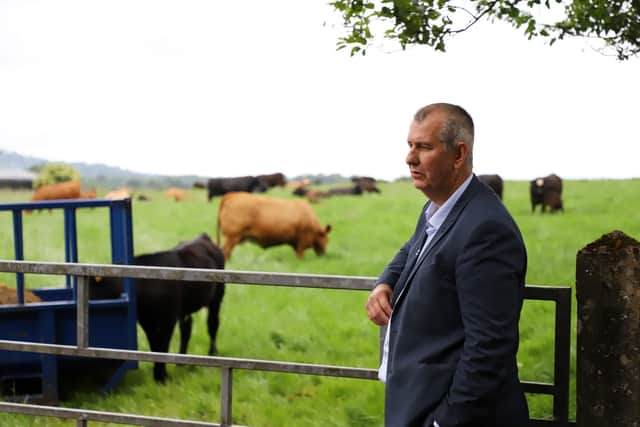Improve the efficiency of livestock sector to help drive productivity - Poots
and live on Freeview channel 276
Beef cattle and sheep farming in Northern Ireland is our predominant agricultural activity, and as such, is a large contributor to agricultural output. However, it produces the lowest output per hectare of all the Northern Ireland sectors.
The Beef Sustainability Package being developed by my Department aims to improve the efficiency of this sector to help drive productivity and sector performance, thereby addressing sector vulnerabilities by increasing profitability.
Advertisement
Advertisement
For the suckler cow producer, this means focusing on breeding management and herd fertility and health to help reduce the amount of time that animals spend on farm in an unproductive state. Not only will this help to improve herd performance, it will deliver environmental benefits by reducing carbon and other emissions and the carbon footprint of the farm as a whole. The suckler cow element of my Beef Sustainability Package will provide support based on meeting targets for the age of first calving for new/replacement heifers in your herd and the calving interval for cows in your herd.


In relation to beef producers, the focus is on the age at slaughter. Cattle finished at an earlier age can help drive both improved productivity and environmental performance. Through the age at slaughter element of the Beef Sustainability Package, I will provide support aimed at reducing the age at slaughter for clean beef animals through measured steps to 26 months.
I recognise that to achieve the targets set for the Beef Sustainability Package will require some of you to make changes to your current practices on farm. Training and support will be available to help you make these changes.
I am also exploring options with the industry that will improve the overall performance and resilience of the sheep sector. There is a need to define the long terms needs of this sector and the industry needs to play a pivotal role in helping my Department identify these.
Advertisement
Advertisement
I have recently agreed that the CAFRE Dairy Enterprise is to be developed as an exemplar in Sustainable Milk Production and that CAFRE both demonstrates and delivers knowledge programmes on reducing your carbon footprint to help you achieve the climate change targets that have been set for Northern Ireland. Key to this, and mirroring the approach for suckler cow producers, is age at first calving and replacement rates within the dairy sector. The use of feed additives to reduce enteric methane emissions will also be adopted and demonstrated.
Currently, Northern Ireland cattle and sheep farmers are predominately making breeding decisions in the absence of performance data and genetic merit. We are not alone in that respect. However, our long-term aim must be to increase the annual rate of genetic gain in the ruminant livestock sectors to drive productivity, resilience, animal health and welfare and environmental gains. Genetic improvement is achieved as a result of breeding from the best performing animals within a population. This requires the accurate identification of those commercial animals with the most desirable traits.
The planned Ruminant Genetics Programme will establish an industry-led initiative focused on driving forward genetic improvement in ruminant animals in Northern Ireland. However, this initiative will require farmers to provide some data and the provision of this data will be an eligibility condition of some future support payments. Knowledge transfer and innovation programmes will also be available to support you to improve the genetic merit of your animals and I would encourage you to avail of these programmes when they become available.
My shared vision for our industry is one with improved productivity, resilience, and environmental sustainability. The outcomes from the measures outlined above will help improve livestock efficiency within our farm businesses and improve overall productivity and profitability. However, an added benefit of these actions is that by removing unproductive animals and practices from your farms, we can drive down our livestock carbon emissions, thereby having a positive effect on our environment.